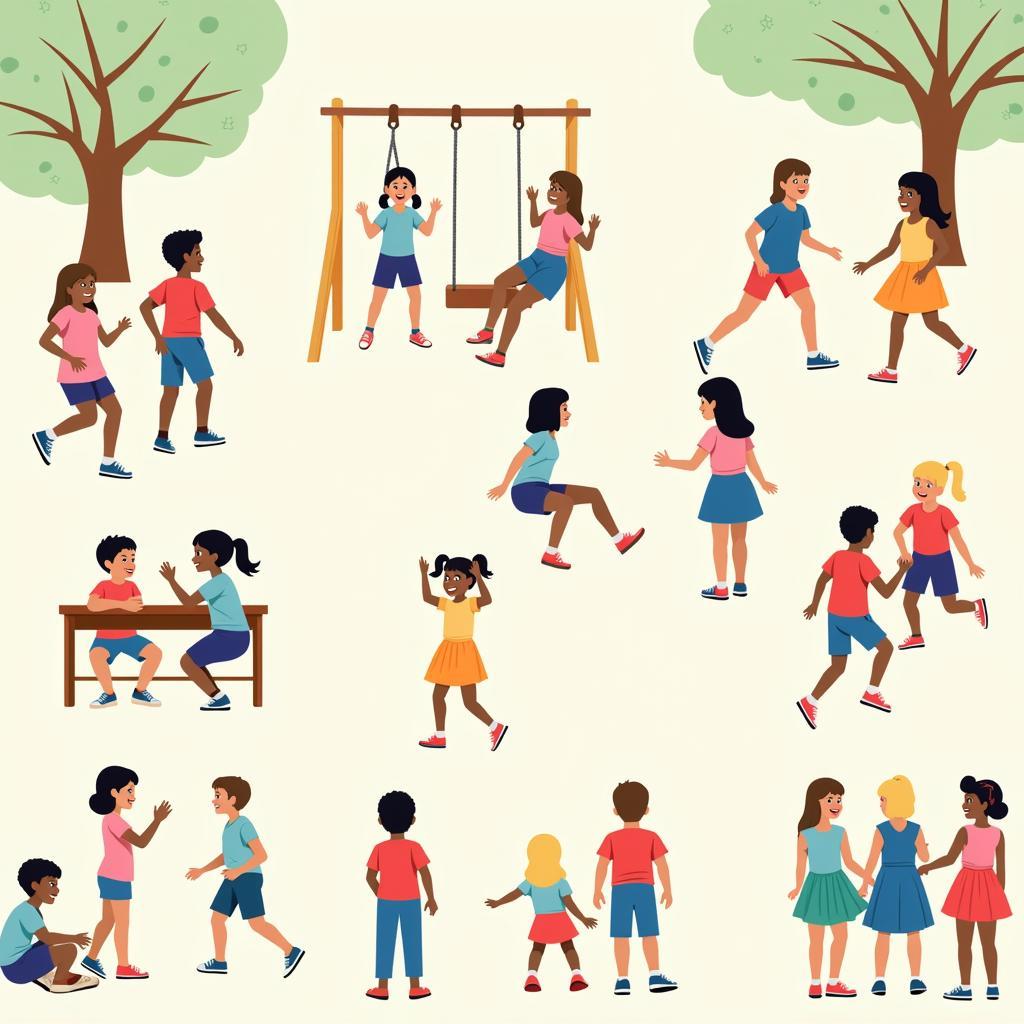Recess, that magical time between classes, is a vital part of the school day. “Bài Viết Về Giờ Ra Chơi Bằng Tiếng Anh” helps us understand its importance. It’s not just a break from studies, but a chance to socialize, play, and recharge. It offers a valuable opportunity for children to develop essential social skills, release pent-up energy, and improve their physical and mental well-being.
The Importance of Recess
Recess provides a much-needed break from the structured environment of the classroom. It allows students to de-stress, refresh their minds, and return to their studies with renewed focus. This unstructured time also fosters creativity and imagination, allowing children to engage in spontaneous play and explore their interests. During recess, children learn valuable life lessons, such as cooperation, negotiation, and conflict resolution, which are crucial for their overall development.
After a period of intense focus in the classroom, recess offers a chance for children to release their energy. Running, jumping, and playing games help them burn off excess energy, promoting physical health and reducing restlessness in the classroom. This physical activity contributes to their overall well-being and helps them develop gross motor skills. Recess also provides an opportunity for children to engage in activities they enjoy, which boosts their mood and reduces stress levels.
Playing with peers during recess enhances social skills, helping children learn to communicate effectively, share, and build relationships. These social interactions are essential for their emotional development and help them develop a sense of belonging. Recess provides a safe and supportive environment for children to practice social skills, learn to navigate social situations, and develop empathy. Navigating the playground’s social dynamics helps children build resilience and develop their emotional intelligence.
 Children playing together outdoors during recess
Children playing together outdoors during recess
What Happens During Recess?
Recess activities can vary depending on the school and the children’s preferences. Some common activities include playing organized games like tag, basketball, or soccer. Others may prefer unstructured play like building forts, drawing with chalk, or simply chatting with friends. The freedom of choice during recess allows children to pursue their interests and develop their individual talents.
Recess is a time for children to express themselves freely and engage in imaginative play. Whether it’s pretending to be superheroes or creating their own games, recess allows children to explore their creativity and develop their problem-solving skills. This unstructured playtime fosters their imagination and helps them develop a sense of self. It’s a time for children to be themselves, without the pressure of academic expectations.
How Can We Make Recess Even Better?
Providing adequate space and equipment can greatly enhance the recess experience. A well-equipped playground with a variety of play structures caters to different interests and abilities. Ensuring sufficient space allows children to move freely and engage in different activities without feeling cramped.
Adult supervision is essential to ensure children’s safety and to help mediate conflicts. Supervisors can also encourage positive interactions and promote inclusive play. Their presence creates a safe and supportive environment where children can play freely and confidently. This allows children to focus on enjoying their playtime and developing essential social skills.
bé chơi xe máy điện đồ chơi is a popular activity, however, ensuring safety is paramount.
Recess and Academic Performance
Studies have shown a positive correlation between recess and academic performance. Regular breaks help improve children’s concentration and attention spans, leading to better learning outcomes. Recess provides a necessary mental break, allowing children to return to the classroom refreshed and ready to learn. By providing a healthy outlet for physical activity and social interaction, recess contributes to a more positive and productive learning environment. The physical activity during recess can also boost cognitive function and improve memory, further enhancing academic performance.
hướng dẫn chơi yugioh duel link or ca ch chơi lư bô trong liên quân can enhance strategic thinking, similar to playground games during recess.
Conclusion
Recess is a vital component of a child’s educational experience, contributing to their physical, social, emotional, and academic development. “Bài viết về giờ ra chơi bằng tiếng anh” highlights its crucial role. By providing a dedicated time for play and social interaction, we empower children to thrive both inside and outside the classroom. Let’s prioritize and protect recess to ensure a well-rounded education for all children.
hướng dẫn chơi mobile legends and other games require teamwork, just like playground games during recess.
FAQ
- How long should recess be?
- What are the benefits of unstructured play during recess?
- How can schools ensure a safe and inclusive recess environment?
- What are some alternative activities for indoor recess?
- How can parents encourage their children to participate in recess activities?
- What is the role of teachers in supporting recess?
- How can we advocate for more recess time in schools?
Common Scenarios
- Scenario 1: A child is being excluded from a game during recess.
- Scenario 2: Two children are having a disagreement over a toy.
- Scenario 3: A child is feeling shy and unsure about joining a group.
Further Reading
Explore articles on the importance of play in child development and the benefits of outdoor activities. Check out resources on conflict resolution and bullying prevention.
For any inquiries about game rules or other matters, please contact us: Phone: 0968204919, Email: [email protected]. Or visit our address: Ấp Tân Lễ B, Tân Thành, Bà Rịa – Vũng Tàu 790000, Vietnam. We have a 24/7 customer support team.
trò chơi máy xúc can also enhance hand-eye coordination similar to some recess activities.